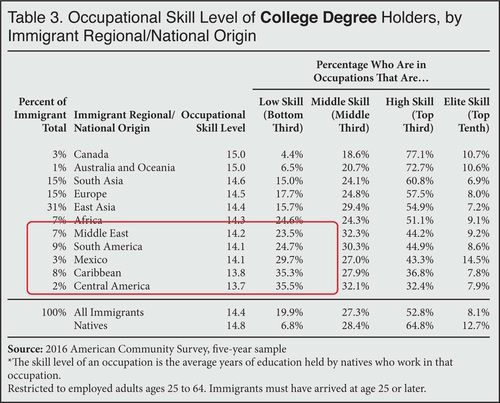
By Steve Sailer
07/12/2018
From the Center for Immigration Studies:
High-Skill Immigrants in Low-Skill Jobs
By Jason Richwine on July 12, 2018
Jason Richwine, PhD, is an independent public policy analyst based in Washington, D.C., and a contributing writer at National Review.
Highly educated immigrants, meaning those who arrive with a college degree or more, often find that their skills do not fully transfer to the U.S. labor market. Many end up holding jobs for which they are overqualified based on their paper credentials. This “occupational mismatch” among legal highly educated immigrants is the subject of this report. By a moderate but significant margin, legal immigrants with at least a college degree are more likely than natives to take low-skill jobs. More importantly, the severity of the mismatch varies widely across sending regions. Legal immigrants from some regions of the world struggle much more than others to utilize their college or advanced degrees. As a consequence, policy-makers should be cautious when designing an immigration system that selects for education.
Some notable findings:
- Among immigrants with a college degree, 20 percent have a low-skill (bottom third) occupation, compared to 7 percent of natives.
- Nearly 30 percent of Mexican immigrants with a college degree have a low-skill occupation, as do 35 percent of Central American immigrants.
- About 85 percent of Canadian immigrants with at least a college degree have a high-skill (top third) occupation, compared to 73 percent of natives and 53 percent of Mexican immigrants.
- Among immigrants with an advanced degree, 37 percent have an elite-skill (top tenth) occupation, compared to 50 percent of natives.
- Length of U.S. residency is not strongly correlated with occupational skill level.
This is a content archive of VDARE.com, which Letitia James forced off of the Internet using lawfare.